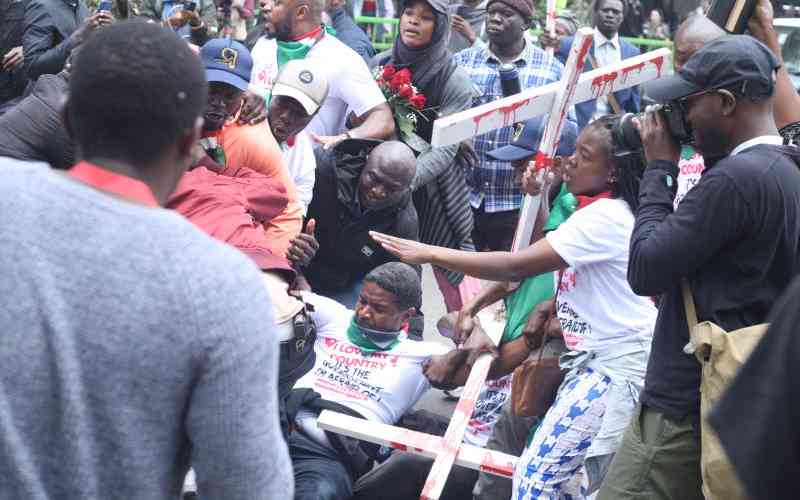
Today we celebrate Mashujaa Day, heroes' day. Every society has had a place for heroes. Our folklore is full of heroes and so does the modern age.
To celebrate the heroes, I will suggest a hierarchy of Kenyan heroes. The list is not scientific and you are free to rearrange or even add heroes that you think I have left out.
Let's start with the parameters that define a hero. You do something extraordinary, often taking unusual risks and society benefits. Your benefit is the not primary reason for taking the risk. But what if those defining heroism set the standard so low? The difficulty in defining heroism makes it easy to sneak in fake heroes.
Our saving grace would be if heroism obeys the laws of economics, you can't cheat the market. If a fake hero, you eventually will be exposed by the market. This usually happens when there is a crisis. Wars, epidemics, economic crises and other disasters expose the real heroes and fake ones too.
Unfortunately, we only see the top of the heroes' pyramid. The bottom is not visible, though important. Is media publicity the only means of identifying heroes? Is getting state recognition the only way to validate heroism? What other means should we use?
Every community has had its parameters of heroism. We are still trying to define our parameters, it's too skewed towards politics. That is why whoever makes it in any sector wants to be a politician.
That is a sign that we do not recognise and reward heroism in other sectors. How much publicity was given to recent Nobel Prize winners compared to the Deputy President's impeachment?
We need sectoral heroes collated every year and by an independent panel. Who are the top scientists, farmers, hustlers, nurses...? Can we also devolve heroism to the counties? Each county should celebrate its heroes.
Time also determines who becomes a hero. We keep revising the list as new heroes arise and others become villains. History is good in exposing skeletons.
Let's not forget that our failure to come up with heroism parameters is partly because we use parameters defined elsewhere. Think of Oscar awards, Nobel prizes, or even honorary doctorates. And they are held in higher esteem than our local parameters. Noted how heroic awards are skewed towards social sciences?
Thank you for your patience. Here is my list.
The top is farmers. They feed us through back-breaking work. They are at the end and the start of supply and value chains. They get the lowest prices for their goods and services, usually raw materials and pay highest for the processed goods. But they never give up and keep us alive till the forces of nature take over.
Two are hustlers. They make little money but hope with patience they will one day break through (omoka). They form the bulk of workers in Kenya, over 80 per cent according to KNBS. Without job security, pensions and perks, they keep the economy running, and by keeping the majority busy, help the country keep peace.
Stay informed. Subscribe to our newsletter
Three are babysitters, the 'house girls', who take care of the most vulnerable and valuable members of society, babies. They are uncelebrated, but if you ever had your house girl leave after you got a new job, you know how important they are. Unknowingly, they can shape the destiny of your child, for life.
Four, are primary school teachers and their ECDE colleagues. They take care of the most vulnerable members of the society. And never get tired. Heard kids talking of their teacher?
Five would be nurses. But their ranking is lower than teachers because of a lack of continuity. Teachers, hustlers and farmers never rest. Nurses can pause when there are no health issues.
Six are security personnel: soldiers, policemen, watchmen and their compatriots. They work 24 hours but their work is muted without incidents.
The top six on my heroes list are frontline workers, a term popularised by the Covid-19 pandemic.
Let's add a seventh category-volunteers. Men and women who donate their time and energy to improve the society. They include interns, chama and court chairmen, and first aiders among others.
Eight, and controversial, are mothers. After carrying the baby for nine months, they must wean it till it can fend for itself. Men relax after 'facilitating' the start of the life cycle. Modern men are trying to help. But they have yet to get a ranking on the heroes list. Some suggest mothers should be number one.
The rest of the heroes? Those at the top of the pyramid have support from those lower down. Doctors get support from nurses, lab technicians, engineers from technicians, architects from draughtsmen and now AI. Politicians have support staff and aides.
In heroism, I am giving credit to only those who do real work. The maize grower gets more credit than the miller or the ugali cook. I give credit to those at the start of the supply chain. Even life's supply chain, with babies, guarantees the next generation of consumers.
You are waiting for me to rank politicians. In popular media, they are at the top. But everything is done for them. And we make or unmake them as voters. Why rank them? Want me to rank clergy? It's hard to rank matters of faith and belief and they are unearthly.
Who have I left out? Where on the list would you put Mau Mau veterans? GenZ?
The next generation of heroes should be those who give us solutions to the pressing problems of the day-slow economic growth, joblessness, national anger, dishonesty, hypocrisy and hopelessness. The next heroes should turn pessimism into optimism.
We should also list anti-heroes, those who reap where they never sowed. In Kenya, they are threatening to overrun true heroes. We should not allow that.